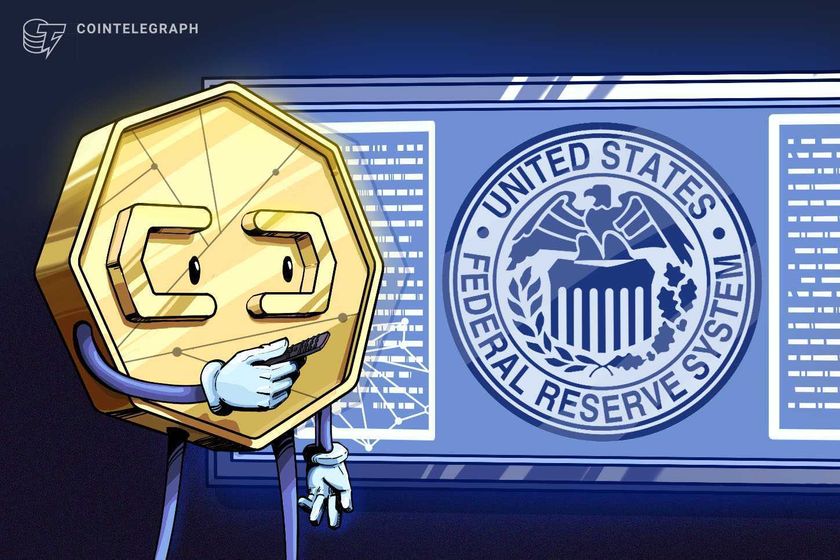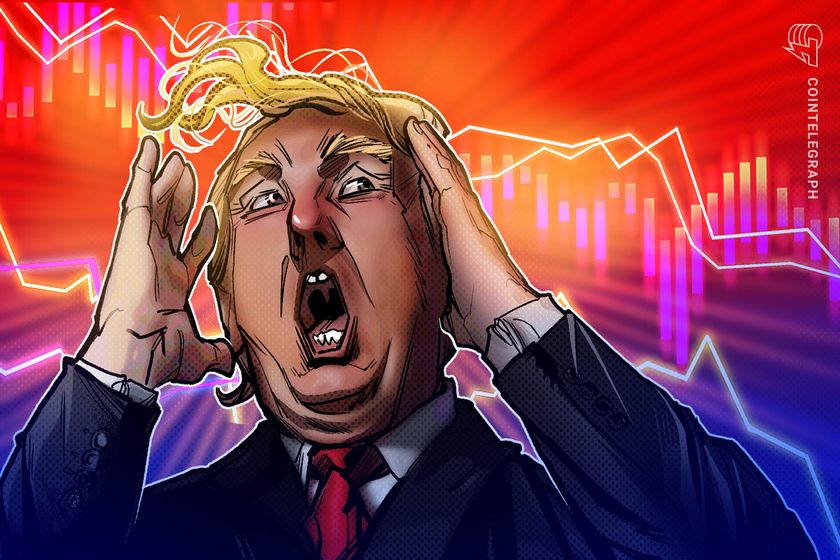

The early days of the Trump administration saw a flurry of activity that could give the crypto industry an idea of forthcoming crypto regulations, namely that they may not be regulated as securities.
Practitioners have decried a lack of concrete change in the form of new rules and guidance. The skeptics have their reasons. The formation of the crypto task force, Trump’s crypto executive order, crypto czar David Sacks’ lone press conference, and the digital asset reserve has been criticized as mere theater.
The real work of regulating comes not in press conferences but in the guidance, enforcement, and rulemaking that support the structure of rules-based systems.
A faithful account of all of the cryptocurrency decisions from the Trump administration reveals a new approach to enforcement and regulation that could meaningfully affect the rights of operators in the United States.
Trump’s regulatory approach opens up banking to crypto
In the dog days of the Biden administration, a policy known as “Operation Chokepoint 2.0” became a major scandal in certain crypto media channels. The allegations were that, during the Obama administration, the Justice Department developed a program called Operation Choke Point that it used to surveil and curtail certain disfavored businesses like payday lenders and firearms dealers.
Some speculated that the Biden administration adopted the same policies for cryptocurrency companies. There was a lot of back and forth over this issue — some denied it ever happened, but many cryptocurrency firms and individuals lost access to banking services.
Whether this was a directive or simply an unforeseen consequence of other policies, many in the industry were incensed; the issue became politically charged.
Crypto execs went on popular shows and podcasts like The Joe Rogan Experience to discuss debanking. Source: Nic Carter
As a result, one of the first steps the Trump administration took regarding crypto was to fix the industry’s debanking problem. This began only two days after Trump took office with Staff Accounting Bulletin 122 (SAB 122), a directive that repealed the Securities and Exchange Commission’s (SEC) SAB 121 — which had effectively prohibited banks from holding cryptocurrencies by making it difficult and inefficient to do so.
On March 7, the Office of the Comptroller of the Currency (OCC) released its own interpretive guidance, Letter 1183, itself undoing Letter 1179. The latter required banks to ask OCC’s permission to participate in certain crypto-native activities like custodying cryptocurrency, holding stablecoin reserve deposits and functioning as validation nodes.
On March 28, the Federal Deposit Insurance Corporation (FDIC) followed up with its own guidance. It rescinded the Biden era FIL-16-2022, which required FDIC-supervised institutions to notify the FDIC of their intent to dabble in crypto and provide information on possible risks.
Acting FDIC Chair Travis Hill also signaled that “banking regulators should not use reputational risk as a basis for supervisory criticisms” at all.
It may be difficult to separate the effects of these policies so early in the administration because banks are large institutions and move slowly. But across three agencies the rules have changed substantially and dramatically, which could have major effects on cryptocurrency access to banking services in the medium to long term.
Fully dismissed crypto cases
Virtually every pending SEC matter with a cryptocurrency defendant has been dropped. While nice for the targets, it doesn’t create much precedent that anyone can build off of. That said, the result does suggest that the underlying activities in those dropped cases won’t be pursued for enforcement, at least for the immediate future.
Related: Ripple celebrates SEC’s dropped appeal, but crypto rules still not set
It’s helpful, then, to consider what activities have received implied license through this campaign of dropped enforcement.
There are a number of cases in which the SEC filed a complaint and litigated to varying degrees of resolution, which the commission either fully dropped or settled without admissions of wrongdoing on the part of the targets:
-
Feb. 27, 2025 — Coinbase Inc.
-
March 3, 2025 — Payward, Inc. (Kraken)
-
March 25, 2025 — Ripple Labs, Inc.
-
March 27, 2025 — Cumberland DRW LLC
-
March 27, 2025 — Consensys Software, Inc.
These cases revolved around the unregistered sale and offer of securities under the Securities Act of 1933, and acting unregistered as a broker, dealer, clearing agency and exchange. While the allegations and actors are different, the common thread between them is that none would be subject to the laws in question if the underlying assets were not themselves securities.
The sole exception is Consensys, which was accused of providing staking as a service without first registering it as a security. While the texture of this claim is familiar, the activity is somewhat different than the pure offer and sale of securities.
This dismissal, along with the related guidance concerning mining pools, suggests that the current SEC does not consider most token-generating activities to be investment contracts, either.
Crypto firms were quick to celebrate after the SEC dropped cases against them. Source: Bill Hughes
Stayed pending resolution
Other cases have been filed in court and halted through joint motions to pause the suits. This is presumably in anticipation of eventually dismissing them, but since they have not yet been dismissed, it is hard to say for sure.
-
Feb. 11, 2025 — Binance and Changpeng Zhao (CZ)
-
Feb. 25, 2025 — Tron Foundation and Justin Sun
-
April 2, 2025 — Gemini Trust Company, LLC
These cases mostly differ from the ones that have already been dropped in that, in the case of Binance and Tron, the government brought allegations not just of unregistered operation but of actual fraud as well. The pause indicates the government may be conciliatory, but the aggravating nature of these allegations is stalling resolution.
Gemini fits more naturally into the category above, and it is not clear why that case has not yet been dropped.
SEC drops investigations into crypto firms
There are other cases where the SEC opened investigations and even issued Wells notices indicating potential enforcement. However, the commission has reportedly ceased investigations after Trump’s inauguration.
-
Feb. 21, 2025 — Robinhood Crypto, LLC
-
Feb. 21, 2025 — Ozone Networks, Inc. (OpenSea)
-
Feb. 25, 2025 — Universal Navigation Inc. (Uniswap Labs)
-
March 3, 2025 — Yuga Labs
The investigations were focused around allegations that non-fungible tokens (NFTs) were securities, or that intermediaries like Robinhood or Uniswap were operating as unregistered brokers.
While little has come of these actions, on balance they match the trend suggested above.
What the dismissals say quietly
None of the dismissals could be considered an SEC edict that certain crypto activities are legal. But taken together, these dismissals, pauses and dropped investigations paint a clear picture of how the current SEC thinks about cryptocurrency’s place in securities regimes.
The SEC dropped charges where allegations revolved around operating as a broker, dealer, clearing house or exchange. This is consistent with the position that the underlying assets themselves are not securities.
The same is true about cases of issuance. The commission dropped charges alleging that an entity issued securities in the form of cryptocurrency tokens.
Still, claims of fraud and market manipulation have not yet been dropped. This might indicate a reticence among commission attorneys to let these claims go. Still, if the assets at hand are not securities, the SEC will not be the correct agency to bring those claims, and so, if the SEC is consistent, then it will likely drop these cases too.
Furthermore, in three official statements, the SEC notified the public that traditional memecoins, proof-of-work mining, including pooled mining, and traditional “covered” or asset-backed stablecoins denominated in dollars are not subject to securities laws.
Related: Crypto has a regulatory capture problem in Washington — or does it?
This, alongside the chain of dismissals, suggests that secondary market sales of fungible cryptocurrency tokens, NFTs, and staking-as-a-service products are also outside of the scope of traditional securities law.
Some might argue that this is more confusing than clarifying, but applying the principle of Occam’s Razor would suggest the SEC simply does not consider cryptocurrency assets to be subject to securities laws as currently construed.
But what does it all mean?
“Flood the Zone” is a tactic that Trump strategist Steve Bannon made famous during the president’s first term, and it might now apply to the manic flurry of policy and dismissals over the past few months.
Take any one at face value and it would be easy to discount the project as insubstantial, but together they arguably represent a sea change in the crypto policy of the United States government.
Banks, once effectively prohibited from holding cryptocurrencies, are now unrestrained. Companies once bogged down in litigation are now free. They may well be followed by new entrants comforted by their survival.
At a biweekly clip, the SEC is releasing new guidance as to which products exist outside its remit. And Trump nominee Paul Atkins isn’t even in the door yet.
This is a dramatically improved regulatory environment, and there are now affirmatively legal paths through which industry participants can do business onchain.
Magazine: 3 reasons Ethereum could turn a corner: Kain Warwick, X Hall of Flame



